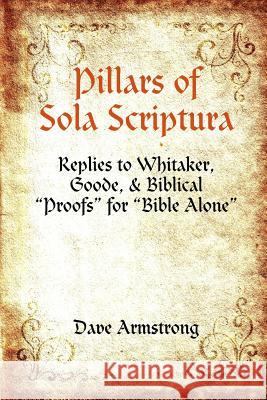Pillars of Sola Scriptura: Replies to Whitaker, Goode, & Biblical Proofs for Bible Alone » książka
Pillars of Sola Scriptura: Replies to Whitaker, Goode, & Biblical Proofs for Bible Alone
ISBN-13: 9781300154822 / Angielski / Miękka / 2012 / 312 str.
Pillars of Sola Scriptura: Replies to Whitaker, Goode, & Biblical Proofs for Bible Alone
ISBN-13: 9781300154822 / Angielski / Miękka / 2012 / 312 str.
(netto: 90,22 VAT: 5%)
Najniższa cena z 30 dni: 93,96 zł
ok. 16-18 dni roboczych
Bez gwarancji dostawy przed świętami
Darmowa dostawa!
"Sola Scriptura" ("Scripture Alone") is considered one of the two "pillars" -- along with "sola fide," or "faith alone" -- of the Protestant Revolt of the sixteenth century. It's fundamental in Protestant thinking with regard to the all-important issue of Christian authority and determination of true theology. Most Protestant defenders of "Scripture Alone" contend that it is taught in the Bible. I maintain that their alleged prooftexts are invariably logically circular and fatally weak. William Whitaker (1548-1595) was an Anglican apologist. His masterwork was "Disputation on Holy Scripture," published in 1588. William Goode (1801-1868), also an Anglican, wrote "The Divine Rule of Faith and Practice" in 1842. These two works are considered by many Protestants to be the best defenses of "sola Scriptura" ever penned. I contend that they fail in their task, and that if indisputable biblical evidences for the position can't be found, it collapses in a heap of self-contradiction.
"Sola Scriptura" ("Scripture Alone") is considered one of the two "pillars" -- along with "sola fide", or "faith alone" -- of the Protestant Revolt of the sixteenth century. Its fundamental in Protestant thinking with regard to the all-important issue of Christian authority and determination of true theology. Most Protestant defenders of "Scripture Alone" contend that it is taught in the Bible. I maintain that their alleged prooftexts are invariably logically circular and fatally weak. William Whitaker (1548-1595) was an Anglican apologist. His masterwork was "Disputation on Holy Scripture," published in 1588. William Goode (1801-1868), also an Anglican, wrote "The Divine Rule of Faith and Practice" in 1842. These two works are considered by many Protestants to be the best defenses of "sola Scriptura" ever penned. I contend that they fail in their task, and that if indisputable biblical evidences for the position cant be found, it collapses in a heap of self-contradiction.











